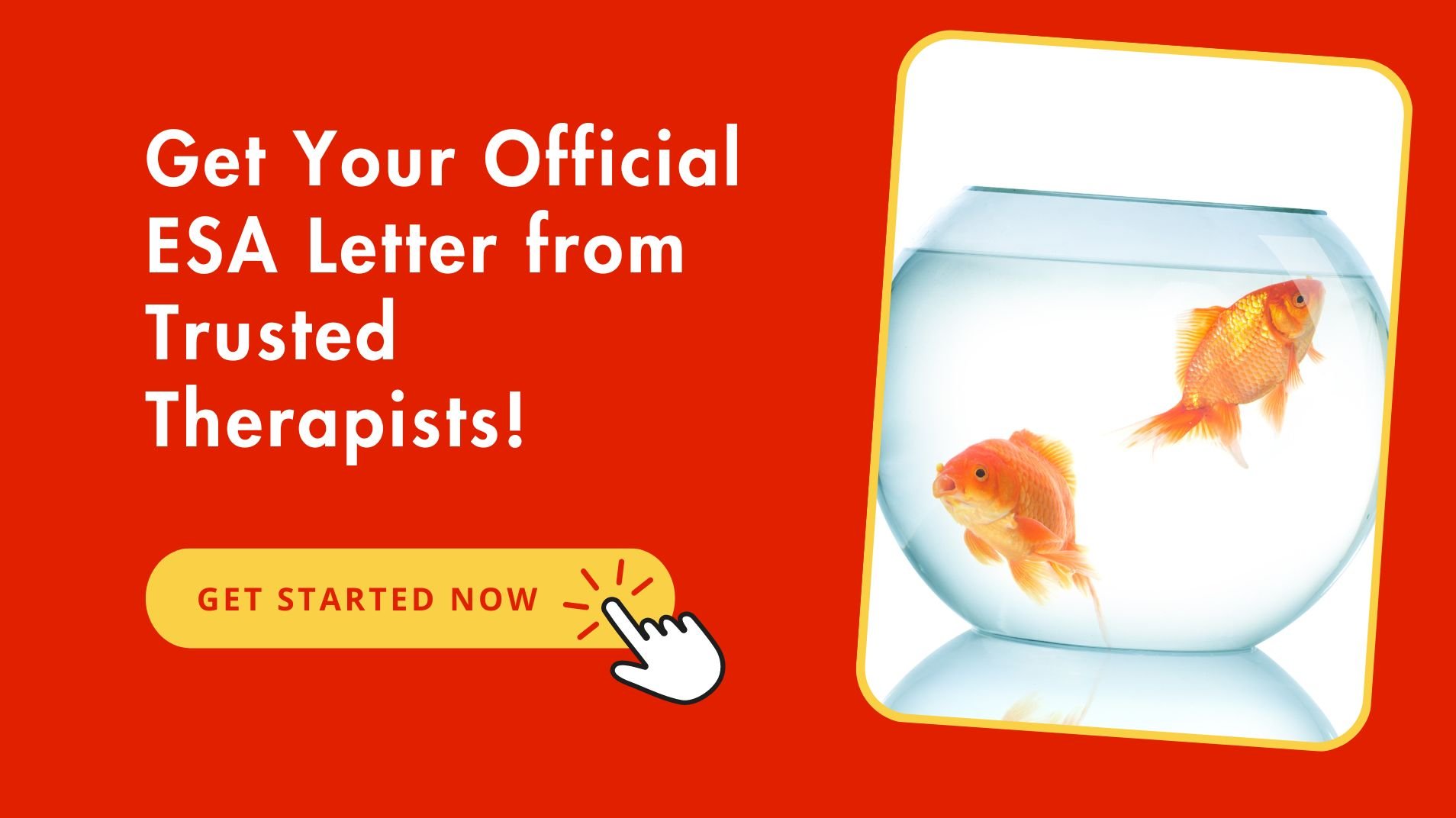Can Emotional Support Fish Improve Your Mental Health?


Can Fish Be Emotional Support Animals?
How Can a Fish Improve My Mental Well-being?
1. Stress Reduction and Relaxation
Studies show that watching fish swim in an aquarium can significantly reduce stress and anxiety levels. The soothing motion of the fish creates a calming atmosphere, similar to the effect of nature therapy.
2. Improved Mental Focus
3. Routine and Responsibility
4. Accessibility
What Are the Laws Relating to Emotional Support Fish?
How to Choose the Right Fish Species as an ESA?
1. Consider the Fish’s Temperament
2. Tank Size and Setup Requirements
3. Compatibility
4. Maintenance and Care Level
5. Visual and Emotional Appeal
What are The Best Fish Species For ESA?
1. Betta Fish
- Why They’re Great: Betta fish are known for their vibrant colors and flowing fins, making them a visually soothing presence. They’re relatively easy to care for and can thrive in smaller tanks, which is ideal for those with limited space.
- Personality Traits: Bettas are interactive and can recognize their owners, even following your finger around the tank. They are solitary by nature, which means they don’t require tank mates.
2. Goldfish
- Why They’re Great: Goldfish are a classic choice due to their lively movements and calm demeanor. They’re hardy fish, making them suitable for beginners.
- Personality Traits: Goldfish are social and can thrive in pairs or groups. Watching their playful behavior can be both entertaining and relaxing.
3. Guppies
- Why They’re Great: Guppies are small, colorful fish that are easy to care for and reproduce quickly, offering a dynamic and engaging environment to observe.
- Personality Traits: They are active swimmers and often exhibit unique behaviors, such as forming schools and interacting with their environment.
4. Neon Tetras
- Why They’re Great: Neon Tetras are small, vibrant fish known for their glowing blue and red stripes. They’re perfect for community tanks and are easy to care for.
- Personality Traits: These fish are peaceful and prefer to be in groups, providing a sense of community and companionship in your aquarium.
5. Angelfish
- Why They’re Great: Angelfish are elegant and graceful swimmers with unique shapes and patterns. They thrive in larger tanks and can become quite interactive with their owners.
- Personality Traits: Angelfish can develop distinct personalities and may become curious about their surroundings and their caregivers.
6. Mollies
- Why They’re Great: Mollies are hardy and adaptable fish that come in various colors and shapes. They’re easy to breed and maintain, making them suitable for beginners.
- Personality Traits: They are peaceful, social fish that can be kept in community tanks, adding to the calming ambiance of an aquarium.
7. Clownfish
- Why They’re Great: Clownfish are popular saltwater fish known for their vibrant colors and association with sea anemones. They require a bit more care but are rewarding to keep.
- Personality Traits: Clownfish are active, social, and can form bonds with their owners, providing an interactive and engaging ESA experience.
How to Make a Fish an ESA?
1. Consult a Licensed Mental Health Professional
2. Obtain an ESA Letter
If your mental health professional agrees that a fish provides emotional support, they will issue an ESA letter. This letter should include your name, diagnosis, the professional’s credentials, and a statement explaining how your fish helps with your condition.
3. Present Your ESA Letter
This ESA letter is your official documentation that your fish is an ESA. You may need to present it to your landlord or housing provider if you live in a place with a “no pets” policy.
What is The Cost of Getting a Fish as an ESA?
While the initial and ongoing costs of keeping fish as ESAs can vary, they are generally more affordable than maintaining other types of ESAs like dogs or cats. Here’s a breakdown of typical expenses:
Initial Costs:
- Tank and Equipment: Depending on the size and quality, an aquarium setup (tank, filtration system, heater, decorations) can range from $50 to $300.
- Fish Purchase: Individual fish prices vary by species. Common types like Betta fish or Goldfish can cost between $5 to $30, while rarer species may cost more.
- Cost of Getting an ESA Letter: You also need to get an ESA letter for your fish. The cost of obtaining an ESA letter can vary, but when working with Fast ESA Letter, you can get it for $149.
Monthly Maintenance Costs:
- Food: Expect to spend around $5 to $15 monthly on fish food.
- Water Treatments and Supplies: Regular maintenance supplies, including water conditioners and cleaning tools, can cost between $5 to $20 monthly.
Unexpected Costs:
- Veterinary Care: Although rare, fish may require medical attention for diseases such as ich or fin rot. Specialized aquatic veterinarians can charge $50 to $100 per visit.
Are There Any Specific Health Concerns Associated with Fish?
While keeping fish as ESAs has several benefits, there are some health concerns to consider:
- Water Quality: Maintaining clean and healthy water is crucial. Poor water quality can lead to the growth of harmful bacteria and algae, which can affect the health of both the fish and humans. Ensure regular water changes and proper filtration to prevent these issues.
- Tank Hygiene: Cleaning the tank and equipment regularly is essential to prevent mold and bacterial buildup. Using appropriate cleaning supplies and maintaining the correct water parameters (pH, temperature, and nitrate levels) can prevent potential health risks.
- Allergies: Although rare, some individuals may have allergies to fish food or tank maintenance products. If you experience any allergic reactions, consult with a healthcare professional to determine appropriate alternatives or solutions.
- Fish Diseases: Fish can be susceptible to diseases such as ich, fin rot, and bacterial infections. These can sometimes be transmitted to humans, although the risk is low. Practicing good hygiene, such as washing hands after handling the tank or fish, can reduce this risk.
How To Care For an Emotional Support Fish?
To get the most out of your relationship with your emotional support fish, proper care is essential:
- Choose the Right Tank: Opt for a tank size that suits your fish’s needs. A well-maintained tank promotes a healthy and stress-free environment.
- Maintain Water Quality: Clean the tank regularly and check water parameters to ensure your fish remains healthy.
- Feed Appropriately: Overfeeding can harm your fish. Stick to a feeding schedule and provide a balanced diet to keep your fish active and vibrant.
- Interact with Your Fish: Spend time observing your fish. Believe it or not, they can recognize their owners and respond to their presence!
Conclusion
Frequently Asked Questions (FAQs)
What Type of Fish Can Be an Emotional Support Animal?
Do I Need a Prescription for an Emotional Support Fish?
How Do I Register My Fish as an ESA?
How Do I Choose the Right Size Tank for an Emotional Support Fish?
What Are the Best Plants and Decorations for an ESA Fish Tank?
How Do I Maintain My Fish Tank for an Emotional Support Fish?
How Do I Get My Fish Recognized as an Emotional Support Animal?
Post Author
Prince Sharma
Related Articles
Can a Turtle Be an Emotional Support Animal?
Can a Turtle Be an Emotional Support Animal? Yes—Here’s How!Yes, a turtle can be an emotional support animal (ESA) if it provides comfort and emotional stability to its owner. While turtles may not offer the same level of interaction as dogs or cats,...
Is a Fox Terrier the Right Emotional Support Dog for You?
Is a Fox Terrier the Right Emotional Support Dog for You?Fox Terriers can be your perfect emotional support animal, offering unmatched comfort and companionship if you're dealing with emotional or mental health challenges. To officially make your Fox...
Can Your Tenant Own an Alligator as an Emotional Support Animal?
Can Your Tenant Own an Alligator as an Emotional Support Animal?Yes, an alligator can become an emotional support animal (ESA) if a licensed professional provides an ESA letter. However, due to safety concerns, many landlords and states may restrict...
Live Free with Your ESA!
An ESA Letter Unlocks Freedom!






